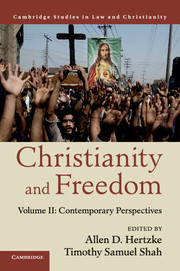Book contents
- Frontmatter
- Colophon
- Contents
- Contributing Authors
- Acknowledgments
- Introduction: Christianity and Freedom in the Contemporary World
- 1 Persecution in the Context of Religious and Christian Demography, 1970–2020
- 2 Patterns and Purposes of Contemporary Anti-Christian Persecution
- 3 Where the Spirit Leads: Global Pentecostalism and Freedom
- 4 Christianity among the Marginalized: Empowering Poor Women in India
- 5 Transnational Christian Networks for Human Dignity
- 6 The Growth and Dynamism of Chinese Christianity
- 7 Christianity and Religious Freedom in Indonesia since 1998
- 8 Christianity and Freedom in India: Colonialism, Communalism, Caste, and Violence
- 9 Vietnam: Christianity's Contributions to Freedoms and Human Flourishing in Adversity
- 10 The Challenge and Leaven of Christianity in Pakistan
- 11 Christianity and the Challenge of Religious Violence in Northern Nigeria
- 12 Copts of Egypt: Defi ance, Compliance, and Continuity
- 13 Between the Hammer and the Anvil: Indigenous Palestinian Christianity in the West Bank
- 14 Christians in the State of Israel: Between Integration and Emigration
- 15 Arab Muslim Attitudes toward Religious Minorities
- 16 They That Remain: Syrian and Iraqi Christian Communities amid the Syria Confl ict and the Rise of the Islamic State
- Index
10 - The Challenge and Leaven of Christianity in Pakistan
Published online by Cambridge University Press: 05 February 2016
- Frontmatter
- Colophon
- Contents
- Contributing Authors
- Acknowledgments
- Introduction: Christianity and Freedom in the Contemporary World
- 1 Persecution in the Context of Religious and Christian Demography, 1970–2020
- 2 Patterns and Purposes of Contemporary Anti-Christian Persecution
- 3 Where the Spirit Leads: Global Pentecostalism and Freedom
- 4 Christianity among the Marginalized: Empowering Poor Women in India
- 5 Transnational Christian Networks for Human Dignity
- 6 The Growth and Dynamism of Chinese Christianity
- 7 Christianity and Religious Freedom in Indonesia since 1998
- 8 Christianity and Freedom in India: Colonialism, Communalism, Caste, and Violence
- 9 Vietnam: Christianity's Contributions to Freedoms and Human Flourishing in Adversity
- 10 The Challenge and Leaven of Christianity in Pakistan
- 11 Christianity and the Challenge of Religious Violence in Northern Nigeria
- 12 Copts of Egypt: Defi ance, Compliance, and Continuity
- 13 Between the Hammer and the Anvil: Indigenous Palestinian Christianity in the West Bank
- 14 Christians in the State of Israel: Between Integration and Emigration
- 15 Arab Muslim Attitudes toward Religious Minorities
- 16 They That Remain: Syrian and Iraqi Christian Communities amid the Syria Confl ict and the Rise of the Islamic State
- Index
Summary
INTRODUCTION
In this paper, I discuss the contemporary experience of Christians in Pakistan. In the first section, I describe the role of Christians during the partition of India. This includes the coalition between Christians and the Muslim League in the mid-1940s, which resulted in the migration of many Christians to Pakistan. I argue that this coalition movement was a sign of mutual trust between Christians and Muslims prior to the formation of Pakistan.
Next, I describe the constitutional changes that occurred after Partition – I argue that these changes were fueled by a national anxiety about the relationship between Islam and the state and, in some instances, constricted freedom for religious minorities. In the final section, I describe the multiple challenges facing Christians in the social context, including discrimination, the pressure of religious conversion, and the Blasphemy Law. I also show Christian responses to sociopolitical discrimination through various means and methods, including the formation of political parties and social institutions such as schools, clinics, and hospitals.
DEMOGRAPHY
Most Pakistani Christians are ethnically Punjabi and divided into many denominations. The Protestant Church in Pakistan is the result of low-caste Hindu conversions to Christianity in the nineteenth century. The largest Protestant denomination, with almost 27 percent of the Christian population, is the Church of Pakistan (COP), which was inaugurated in 1970 through a union of Anglicans, Methodists, Lutherans, and Scottish Presbyterians. The next largest denomination is the Presbyterian Church of Pakistan, which was formed in 1990 by the merger of the United Presbyterian Church and the Lahore Church Council. Both the United Presbyterian Church and the Lahore Church Council suffered a schism in 1968 that led to the creation of the Presbyterian Church, which has a sizable following. Other Protestant denominations include the Associate Reformed Presbyterian Church, Baptists, Brethren, Church of Christ, Church of St. Thomas, the Evangelical Church, Eastern Orthodox, Pentecostals, Salvation Army, and Seventh-Day Adventists.
The largest Christian denomination is the Roman Catholic Church, with approximately one-third of the population. In contrast to Protestants, many Catholics are descendants of affluent families from South India or converts from high-caste Hindu backgrounds. There is a sizable Catholic Goanese presence with ancestral connections to Portuguese conversions during the sixteenth century. There is also a small Anglo-Indian community, the result of intermarriage between British Christians and Indians.
- Type
- Chapter
- Information
- Christianity and Freedom , pp. 284 - 305Publisher: Cambridge University PressPrint publication year: 2016



